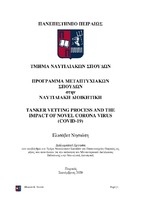Tanker vetting process and the impact of novel Corona virus (COVID-19)

Master Thesis
Συγγραφέας
Νησιώτη, Ελισάβετ
Nisioti, Elisavet
Ημερομηνία
2021-09Επιβλέπων
Παντουβάκης, ΆγγελοςΠροβολή/
Λέξεις κλειδιά
SIRE Inspection ; Vetting ; TMSA ; OCIMFΠερίληψη
Ο όρος "επιθεώρηση" είναι η συνηθέστερη λέξη που χρησιμοποιείται για να περιγράψει τη διαδικασία αξιολόγησης που υποβάλλονται τα δεξαμενόπλοια από τις εταιρίες πετρελαίου προκειμένου να επιλέξουν αυτές τα πλοία που θα μεταφέρουν τα φορτία τους.
Είναι μια ευρέως διαδεδομένη και αποδεκτή διαδικασία, παρ' όλ' αυτά δεν υπάρχει επαρκής βιβλιογραφία, κυρίως σε ότι αφορά την πλευρά της διαχειρίστρια εταιρίας των δεξαμενοπλοίων.
Κατά το πρώτο στάδιο της διαδικασίας, ένας επιλεγμένος επιθεωρητής ανεβαίνει στο βαπόρι, προκειμένου να διεξάγει έναν φυσικό έλεγχο σε αυτό και να γράψει και να υποβάλει μια έκθεση επιθεώρησης. Μετά την υποβολή αυτής της έκθεσης, η διαχειρίστρια εταιρία πρέπει επίσης να υποβάλει τα σχόλια της σε τυχόν παρατηρήσεις που κατέγραψε ο επιθεωρητής και να εισάγει τέλος την έκθεση μαζί με τα σχόλια στην ηλεκτρονική πλατφόρμα του OCIMF.
Σε μεταγενέστερο στάδιο, οι εταιρίες πετρελαίου θα πραγματοποιήσουν μια ανασκόπηση σε αυτού του είδους εκθέσεις καθώς και άλλων εγγράφων, έτσι ώστε να αποφασίσουν και τελικά να επιλέξουν το πλέον κατάλληλο πλοίο για να ναυλώσουν.
Μια εταιρία πετρελαίου χρειάζεται να αξιολογεί όχι μόνο τα έγγραφα που προαναφέρθηκαν αλλά και τα συστήματα ασφαλούς διαχείρισης των ναυτιλιακών εταιριων καθως και την συνολικη τους επιδοση. Αυτο το πετυχαινουν διεξαγοντας έλεγχους επαλήθευσης TMSA. Τα τελικα αποτελεσματα παιζουν πολυ μεγαλο ρολο στις αποφασεις που θα παρουν οι εταιριες πετρελαιου. Η επιθεώρηση ως διαδικασία επιλογής πετρελαιοφόρων έχει κερδίσει τη θέση της στον κλάδο ως ένα δίχτυ ασφαλείας το οποίο συλλέγει και ελέγχει όλες τις πληροφορίες που συλλέγονται από τα άλλα δίχτυα ασφαλείας. Έλεγχοι που προέρχονται απο τη σημαία του κράτους, τον νηογνώμονα, των λιμενικών αρχών και άλλων.
Οι επιθεωρήσεις, οι έλεγχοι TMSA και γενικότερα η Ναυτιλιακή Βιομηχανία έχει επηρεαστεί σε πολύ μεγάλο βαθμό από την πανδημία του COVID-19 που έχει ξεσπάσει τον τελευταίο χρόνο. παρ' όλ' αυτά νέες πρακτικές όπως οι απομακρυσμένες επιθεωρήσεις έχουν ενεργοποιηθεί.
Θα παρουσιαστεί μια πραγματική μελέτη περίπτωσης, που χρησιμοποιεί το Τμήμα Vetting μιας Εταιρείας Διαχείρισης Δεξαμενόπλοιων για να επιτύχει τα υψηλά πρότυπα της βιομηχανίας και την απαιτούμενη συνεχή ανάπτυξη.


